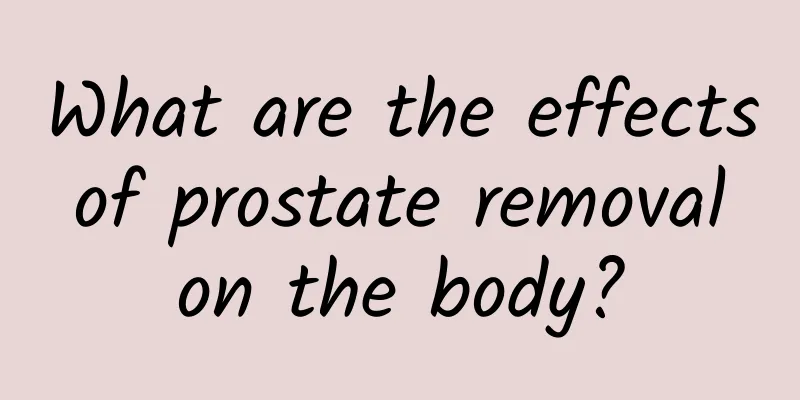What are the effects of prostate removal on the body?

|
At present, many people suffer from diseases such as prostate. We also know that if there is a problem with the prostate, it will have a great impact on the patient, and even affect the quality of male sperm. When suffering from prostate, many people will use prostatectomy to restore their health. So what effects will prostatectomy have on the body? In order to help patients understand more about this, let us learn about the relevant knowledge together. Preoperative preparation 1. Most patients are elderly and in poor general condition, often accompanied by other diseases (such as hypertension, heart disease and diabetes, etc.). Therefore, a comprehensive and detailed examination and assessment of the patient's general condition must be performed before surgery. In addition to general physical examination, special attention should be paid to the determination of renal function (such as blood non-protein nitrogen, CO2 binding capacity and phenol red test, etc.). In addition, it is necessary to measure blood pressure multiple times, check the fundus, electrocardiogram, chest radiography and liver function. For those with renal insufficiency, the bladder should be drained and surgery should be performed after the renal function improves. 2. Patients often have urinary tract infection before surgery. Catheterization can improve the above situation, but long-term indwelling can cause infection. In order to reduce postoperative wound infection, antibiotics can be taken a few days before surgery, and the bladder can be flushed with antibacterial solution half an hour before surgery. Commonly used antibacterial solutions are 1:2000 furazolidinone and 1:5000 potassium permanganate. After the bladder is cleaned, fill it with flushing solution. 3. Cystoscopy can directly observe the bladder condition, the type of prostatic hypertrophy, and whether there are other complications of the bladder (such as stones, diverticula, etc.), but it does not need to be routinely performed before surgery. 4. Before prostatectomy, bilateral vasectomy is usually performed to prevent orchitis. (1) If urination is still difficult or even urine retention occurs after surgery, the reasons are: first, the hyperplastic glands were not completely removed during the operation, and the solution is to perform another electrosurgical resection; second, the patient already has a neurological defect that makes urination difficult. Appropriate examinations and treatment should be given, and the two reasons should be explained clearly to the patient. (2) Abnormal urination: Microscopic hematuria and purulent urine may persist for several months after surgery. There are two reasons for this: one is the gradual shedding of necrotic tissue during wound healing, and the other is the possibility of kidney disease. Therefore, detailed examinations should be performed to clarify the cause and provide treatment. (3) Epididymitis: Due to the use of preventive antibiotics before and after surgery, the incidence of epididymitis after surgery has been greatly reduced, but it still occurs in a small number of cases. If swelling and pain in the scrotum occur after surgery, you should seek medical attention immediately. (4) Urinary incontinence may be related to surgery, or it may be caused by inflammation, tumors, stones or neurological factors. Therefore, appropriate examinations should be done to find out the cause. (5) In case of urethral stenosis, the stricture should be carefully identified and the urethra should be dilated or electroresection should be performed again. (6) About 1.4% of patients develop impotence after sexual dysfunction surgery. Many patients also complain of dissatisfaction with sexual intercourse, which may be related to psychological factors and should be given psychological counseling. Since transurethral resection may cause incomplete closure of the internal urethral sphincter, it may lead to retrograde ejaculation, that is, semen does not exit the body but enters the bladder. Those who do not have fertility problems do not need treatment. Those who want to have children can try ephedrine treatment, which is sometimes effective. The impact of prostate removal on the body is relatively large. Therefore, if the patient's disease is serious and prostate removal is necessary, then it is necessary to find a regular hospital for surgery. This can also increase the success rate of the surgery and reduce the risks of the surgery to the body. Therefore, patients must pay more attention to this aspect. |
<<: Will circumcision affect sexual life?
>>: What should men eat before drinking to avoid getting drunk?
Recommend
Will I have blood in my urine if I have chronic prostatitis?
Chronic prostatitis is a common disease that caus...
Is it really your wife’s problem that she can’t have children?
In life, many couples who are unable to have chil...
Men's menopause symptoms are the most obvious
Men and women experience menopause, and there are...
Don’t ignore the fact that the foreskin is too long! There are many benefits to men getting circumcised
According to andrology experts, prepuce is a comm...
Barley and red bean porridge helps you get rid of moisture and eczema
We all know that barley and red bean porridge has...
Why does a man bleed when he poops?
Men are the support of a family. Once bloody stoo...
Can low sperm survival rate in men be cured?
If male friends have symptoms of low sperm surviv...
Pain in the lower abdomen and left testicle
The testicles are one of the most sensitive parts...
Girls first time boys hurt
Everyone knows that when a girl has sex for the f...
Is it normal for semen to leak out every time I ejaculate?
We all know that the necessary condition for preg...
What causes dizziness after ejaculation?
Men experience back pain after ejaculation, accom...
Men's hair is hard
If male friends find that their hair is becoming ...
Five foods that make men weaker the more they take
First place: Fatty meat Consequence: Makes men im...
What are the symptoms and causes of schizophrenia?
China is a country with a high incidence of menta...
Prostate lecithin body therapeutic effect
If there is a problem with the prostate, it is qu...









